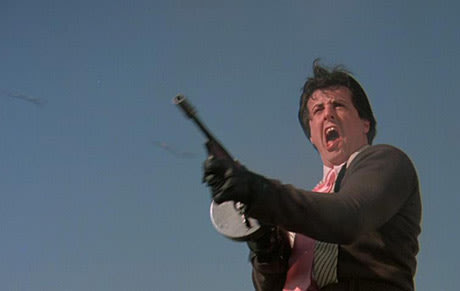In the mondo special features of this latest DVD incarnation of Death Race 2000, Roger Corman describes his reaction to reading sci-fi novelist Ib Melchior's 1956 short story The Racer, then a serious, cautionary, futurist tale. Corman, ever the astute producer and money maker, saw this story as a comedy and thus turned it into a raucous road movie, part action, part comedy, part science fiction and part cultural satire. Twenty-five years later, when the millennium rolled around, we didn't exactly see our society debased to the level of nihilism of Death Race 2000, but with the onset of reality TV, which was only a couple years away from really breaking out, Corman wasn't that far off, and as social commentary, it's surprisingly sharp. While proponents might overdo the profoundness of the film's critique on the media and society's growing insatiability for violence, we can't forget that it's also a b-grade action picture with some breasts. It's a story that has been told in many other forms since 1975. Natural Born Killers, The Running Man, Battle Royale, Speed Racer and much of the modern videogame culture, whether conscious or not, all take influences from Corman/Bartel's vision, however kooky and bizarre. It's the year 2000, and society has devolved into a Roman-like world where the people's need for violence is organized into a gladiatorial event called the Death Race: a cross-country car race/game show where contestants earn points by killing opponents and pedestrians. Among the contestants is Machine Gun Joe Viterbo (played well by a pre-Rocky Sylvester Stallone), Roberta Collins' Matilda the Hun, Martin Kove's Nero the Hero and the best of the best, Frankenstein (played with cool, iconic aloofness by David Carradine). As the racers cruise the highways running down innocent victims with glee, we see a clandestine resistance movement angling to subvert the games and take down the government. Frankenstein feels the threat from all angles, including his trusted navigator, who may or may not be working for the resistance. Most of the laughs come from the audacity of the extreme concept and the audience's ability to embrace the kitsch. The cartoonish tone aids in the satire, as well as taking our attention away from the production deficiencies. The DVD is chockfull of special features, more than enough to please geeky film buffs and collectors. There are multiple commentaries, including Corman, assistant director Lewis Teague, editor Tina Hirsch and director John Landis, interviews with Corman, Carradine and story author IB Melchior, and multiple featurettes on many of the film's production elements.
(Shout! Factory)Death Race 2000
Paul Bartel

BY Alan BacchusPublished Jun 17, 2010



